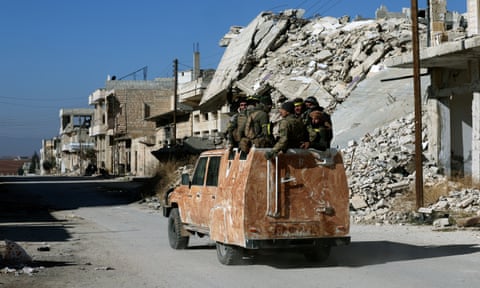Syrian Surprise Assault --Turkish Game of Regime Change
"Hayat Tahrir al-Sham, part of an alliance of terrorist groups active in Syria and with links to the Islamic State (ISIS) and Al-Qaeda, was formerly known as Jabhat al-Nusra, and served as Al-Qaeda's affiliate in Syria. The organization is a jihadist group that upholds Sharia law, occupies Syria's Idlib area and cooperates with the Turkish military and Turkish-backed groups in Syria. Abu Bakr al-Baghdadi, the leader of ISIS, was also involved in HTS's formation.""Turkey is unleashing another gruesome jihad in Syria. The city of Aleppo is now effectively under the control of Turkish-backed jihadist groups. Tens of thousands of Christians, Kurds and other minorities are in danger of extermination. Videos of jihadists abducting Kurdish women have also surfaced on social media."Uzay Bulut, Gatestone
"MISSING FROM MEDIA REPORTS ON ALEPPO: 'Rebels' taking city are NOT Freedom Fighters but Turkish-backed Islamists with same ideology as ISIS that target Yazidis, Christians and other religious and ethnic minorities."The USCIRF reports they 'target religious minorities, especially Yazidis, for rape, assassination, kidnapping for ransom, confiscation of property, and desecration of cemeteries and places of worship.'USCIRF Factsheet says Hay's Tahrir al-Sham (HTS) 'remains a potent source of a Salafi-jihadism that restricts the religious freedom of non-conforming Sunni Muslims and threatens the property, safety, and existence of religious minority groups such as Alawites, Christians, and Druze.' They also report 'torture, forced disappearance, rape and other sexual violence, and killing in detention.'"Expect the same horrific crimes from these Turkish-backed Islamist militias (including HTS) that we have seen from them in other parts of Syria. They learned from the international response to ISIS to not make an immediate public display of this violence.".... [A]reas under government control are also horrible as they endure 'egregious human rights abuses such as arbitrary detention and torture, enforced disappearance.' Nadine Maenza, the Former Chair of the United States Commission on International Religious Freedom (USCIRF)
 |
| Pictured: Turkish-backed jihadists patrol in central Aleppo on November 30, 2024. (Photo by Muhammad Haj Kadour/AFP via Getty Images) |
Syria's 13-year-old uncivil
war that witnessed an estimated half-million deaths assigned to the
country's regime under President Bashar al-Assad spurred by Sunni
Syrians demanding equal treatment to the minority Alawite Shiites
represented by Assad, ignited a destructive response from the Syrian
military that turned a protest into a civil war. It did not take long
for the country to be flooded with the presence of Sunni terrorist
groups eager to contest the Syrian military in an exchange of
tribal/secular conflict.
Now,
a complex patchwork of terrorist fighters whose focus is on opposing a
number of various enemies have converged to challenge the regime once
again. A lightning assault last week against government forces in the
northwest of the country is in the process of altering the front lines
in the conflict. The Hayat Tahir al-Sham (HTS) Islamist salafist group
poses a formidable challenge to the Assad regime. It is predicted by
Middle East experts that this current and growing conflict has the
potential to go beyond the country itself.
 |
| Syrian opposition fighters ride on a truck in Khan Sheikhoun, south-west of Aleppo. Photograph: Ghaith Alsayed/AP |
The
United States has distanced itself from the offensive, while Russia and
Iran, both involved in giving dedicated support over the years of
conflict to Syria, both distracted at present by their own disparate
conflicts -- as well as Hezbollah in Lebanon -- may yet be drawn more
into the Syria defensive. The HTS group, over a period of a decade was
involved in disabling the Syrian government in its bid to establish
Islamic rule in Syria as the successor to al-Qaeda affiliate Jabhat
al-Nusra, now on the ascendancy.
It
has in the last few years, attempted to soften its harsh image of
Islamist intolerance, claiming recently it will protect Aleppo's
cultural and religious sites, including churches. Troops loyal to Assad
have to this point managed to fend off efforts to topple his regime,
since 2011. Assad's forces back then with its violent crackdowns on
protests moved the situation from protest to full volume rebellion.
Opposition rebels had until recently been contained within part of
north-western Syria with the help of Iran, Russia and Hezbollah.
Suddenly,
government forces seem to have abandoned their upper hand in the face
of growing resistance from opposition rebels, wresting control of
Aleppo, although the military claimed it was redeploying troops from
areas controlled in Aleppo and Idlib provinces, aided by joint
Syrian-Russian air force bombardments. Jake Sullivan, U.S. national
security adviser, spoke of the rebels' advance in connection with
Russia, Iran and Hezbollah, weakened through conflicts elsewhere.
According to Turkey's state-operated Anadolu Agency,
the Syrian National Army -- a loose coalition of Turkish-backed forces
-- took part in the recent rebel offensive. The SNA in joining the
latest fighting did so primarily against Kurdish fighters in northern
Syria who have in the past fought Assad's government, as well as HTS and
Islamic State Islamists. Turkey's goal is its fight against Syrian
Kurdish fighters considered by Turkey to be terrorists for their links
to the Kurdistan Workers' Party (PKK) which launches attacks against
Turkey for Kurdish independence.
 |
| Aleppo, Economist Intelligence |
Labels: Bashar al-Assad, Hezbollah, Iran, Rebel Islamists, Russia, Syrian Alawites, Syrian Sunnis, Turkey/Kurds

<< Home